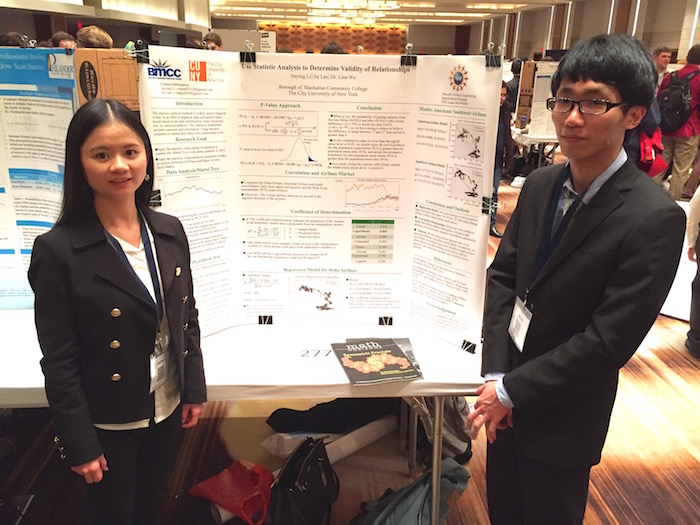
Several Borough of Manhattan Community College (BMCC/CUNY) faculty and students traveled to Atlanta on January 7-8 for the 2017 MAA-AMS Joint Mathematics Meeting, the largest math gathering in the world according to conference organizers.
This was the first time BMCC students attended the conference. Math majors Karen Medlin, Papa Sylla, Jie Lan, and Jieying Li presented research and posters at the conference. They were able to make the trip to Atlanta because of funding from the Minority Science Education Improvement and Retention and Improvements in STEM Education Program (MSEIP-Pipeline) project.
Funded by a $750,000 grant from the U.S. Department of Education, the MSEIP-RISE project— Creating Career Pathways in Mathematics through the Recruitment and Retention of Talented Community College Students— aims to create a supportive and innovative STEM pipeline that includes opportunities for research and internships. Three BMCC MSEIP faculty members including Mathematics Professor Annie Han, who is the MSEIP project’s Principal Investigator, along with Mathematics Professors Lina Wu and Fatima Prioleau accompanied the students.
Students Jieying Li and Jie Lan, who were mentored by Professor Lina Wu, presented research findings on their report titled Use of Statistic Analysis to Determine the Validity of Relationships. Li and Lan also won a travel grant from the MAA-AMS conference organizers.
“Our research topic was about the stock market and finance modeling. In this case, in order to combine math and finance,” said Li.
The meeting opened her eyes to future opportunities in the math field, said Li, who graduates in Spring 2017.
“I met mathematicians who were conducting interesting research, such as how to connect math and music and what sorts of careers are relative to a love of math,” said Li.
BMCC Math major Papa Sylla, who was mentored by Fatima Prioleau presented his research on the Relation Between Permutable Prime’s Infiniteness and Public Key Exchange. “The most rewarding aspect of presenting at the conference was meeting and gaining insight from the professors, researchers and entrepreneurs,” Sylla said.
A Pipeline Opportunities for Inter-Collegiate STEM Education (POISE) member, Sylla plans to enroll in the Mathematics and Computer Science program at New York University after he graduates BMCC in Spring 2017.
Student Karen Medlin was mentored by Professor David Allen on her project, called The Perceptron: An Introduction to Machine Learning, which she presented in Atlanta.
Medlin said Allen’s classroom lessons illuminated concepts that led to her project investigating math’s underpinning in artificial intelligence.
“I am a returning student, having earned a bachelor’s degree in English and worked for five years in advocacy and fundraising for the arts. I’ve been inspired by each of my classes at BMCC and I am planning to continue my studies in graduate school where I shall pursue a Ph.D. in applied math,” said Medlin.
During her faculty presentation, Han says she shared preliminary results of the overall BMCC MSEIP project.
She said MSEIP has focused on three aspects of success: improving how math courses are taught, recruiting more women and minority students, and providing support and encouragement to students through a faculty-mentoring Student Summer Research project, and a peer-mentoring program called Helping Hands.
“We shared aspects of our effective outreach activities and retention programs strategies during the presentation,” Han said.
Other BMCC Mathematics faculty members who attended the conference and presented research included Christopher McCarthy, Johannes Familton, Lucio Prado and Jean Richard. Fred Peskoff, chair of the BMCC Mathematics department and Betina Hansel, BMCC Director of Institutional Research also attended.
STORY HIGHLIGHTS
- BMCC Faculty and MSEIP students present at conference
- Participants funded by $750,000 DOE grant
- BMCC Professor Annie Han shared preliminary findings of MSEIP project

